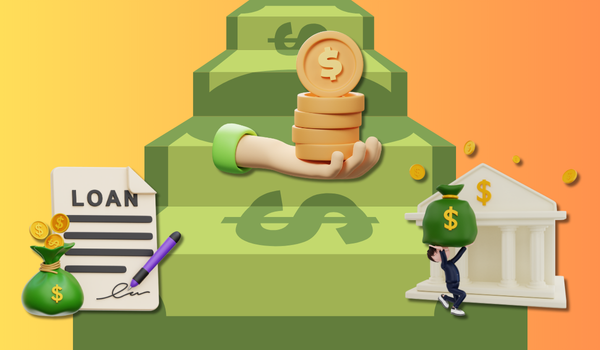Unlocking the power of home equity is one of the most valuable financial strategies homeowners can use to achieve their goals.
Whether you're looking to fund a home renovation, consolidate high-interest debt, invest in a business, or pay for educational expenses, home equity can provide a lower-interest alternative to personal loans or credit cards. In this guide, we’ll explore what home equity is, the benefits of using it, how to leverage it effectively, and the steps to secure the right financing option.
.png)
Understanding Home Equity and Its Leverage Potential
What is Home Equity?
Home equity is the difference between your home’s current market value and any outstanding mortgage balance. Essentially, it represents the portion of your home that you own outright. For example, if your home is worth $500,000 and your mortgage balance is $300,000, your equity in the property is $200,000.
Over time, home equity can increase as you make mortgage payments or if the market value of your home appreciates. It can be one of your largest assets, especially if you’ve owned your home for many years or invested in improvements that have increased its market value. Homeowners can typically access up to 80-90% of this equity for financing, depending on lender policies and current market conditions.
The Benefits of Utilizing Home Equity as Leverage
Leveraging home equity provides a few key advantages.
- Lower Interest Rates: Because home equity loans and lines of credit are secured by your property, lenders can offer lower interest rates than unsecured loans or credit cards.
- Larger Loan Amounts: Since home values tend to be high, the equity in your home can be a sizable source of funds, allowing you to access a large loan amount compared to typical personal loans.
- Potential Tax Benefits: Interest on home equity loans may be tax-deductible if the funds are used for home improvements, although this is subject to specific IRS regulations. Consult a tax professional to see if your planned expenses qualify.*
- Flexible Usage: Whether for home renovations, education, debt consolidation, or starting a business, home equity financing is versatile and can support a wide range of financial needs.

How to Leverage Home Equity Effectively
Assessing Your Financial Goals
The first step in leveraging home equity effectively is to clarify your financial goals. Different goals may call for different types of home equity loans. For instance:
- Home Improvement Projects: A home equity line of credit (HELOC) might be suitable since it allows you to draw funds as needed.
- Debt Consolidation: A home equity loan with a fixed interest rate could help you consolidate high-interest debts into one manageable monthly payment.
- Business Investment: Accessing equity through a cash-out refinance could provide a lump sum that allows for greater capital flexibility, especially if you anticipate that your business venture will grow steadily.
Clearly defining your goals will help you select the best loan type and avoid overborrowing or misusing funds.

Types of Home Equity Loans
When tapping into home equity, you have several options, each with its own terms and benefits.
- Home Equity Loan: Often referred to as a second mortgage, this loan provides a lump sum of money at a fixed interest rate, repaid over a set term. It's best for large, one-time expenses like home renovations, medical bills, or debt consolidation. Since payments are consistent, budgeting for repayments is simpler.
- Home Equity Line of Credit (HELOC): A HELOC functions more like a credit card. It provides a revolving line of credit with a variable interest rate, allowing you to draw funds as needed, up to a pre-set limit. HELOCs are ideal for projects that require flexibility, such as ongoing home improvements or unpredictable medical expenses. They have a “draw period” (typically 10 years) during which you can access funds, followed by a “repayment period” (typically 10-20 years) when you repay the balance.
- Cash-Out Refinance: This option involves refinancing your existing mortgage with a new one that has a higher balance, allowing you to “cash out” a portion of your equity. Cash-out refinancing can be advantageous if current interest rates are lower than your original mortgage rate, as it lets you both refinance for a potentially lower rate and access equity.

Avoiding Common Pitfalls
Using home equity for the wrong reasons or overborrowing can result in financial strain and potential risk of foreclosure. Here are some common pitfalls to avoid:
- Overextending Your Finances: Borrow only what you need and can reasonably repay. An unexpected job loss, illness, or economic downturn could make it difficult to keep up with payments.
- Choosing the Wrong Loan Type: Not all home equity loans suit every purpose. Ensure the loan type aligns with your financial goal to avoid repayment complications or unnecessary interest expenses.
- Ignoring Loan Terms and Fees: Pay attention to closing costs, annual fees, and prepayment penalties, which vary by lender and can add significantly to the loan’s cost.

Steps to Secure Home Equity Financing for Leverage
Evaluating Your Home Equity
To estimate your home equity, determine your home’s market value. While online appraisal tools can give a ballpark figure, a formal appraisal provides a more precise valuation. Once you know the current value, subtract any outstanding mortgage balance to see how much equity is accessible.
Lenders typically allow you to borrow up to 80-90% of your home’s value. For example, if your home is worth $500,000 and you owe $300,000, lenders may let you borrow an additional $100,000 to $150,000 based on your eligibility and risk assessment.
Preparing Your Financial Profile
Lenders assess your credit score, income, debt-to-income (DTI) ratio, and employment stability to determine your eligibility and the interest rate. Here’s how to make your financial profile as strong as possible:
- Review Your Credit Score: Higher scores usually qualify for lower interest rates. Consider addressing any discrepancies or issues on your credit report that might impact your score.
- Collect Documentation: Have your recent tax returns, pay stubs, and proof of other income ready. Self-employed applicants may need additional documentation, such as business tax returns.
- Reduce Existing Debt: A lower DTI ratio signals lenders that you’re financially responsible, which can lead to better loan terms. Pay down high-interest debt if possible.

Comparing Lenders and Rates
Not all lenders offer the same rates, fees, and terms for home equity products. Taking the time to shop around can save you thousands of dollars over the life of your loan:
- Interest Rates and Terms: Compare interest rates and decide whether a fixed or variable rate best suits your needs. Consider whether shorter or longer terms fit your financial plans, as this affects both monthly payments and total interest paid.
- Fees and Closing Costs: Some lenders charge application fees, closing costs, or annual fees. Be aware of these potential charges, as they can impact the overall affordability of your loan.
- Loan Options: Not all lenders offer all types of home equity financing, so look for one that provides your preferred loan type and competitive terms.
Leveraging home equity can open doors to a range of financial opportunities, helping you achieve major personal and financial goals. However, responsible borrowing is crucial to prevent potential financial strain. By understanding your options, assessing your goals, preparing a solid financial profile, and carefully comparing lenders, you can make the most of your home equity and use it as a powerful tool for financial growth.
Taking the time to plan and consult with financial advisors where needed ensures that your equity works in your favor and secures a stable financial future. Remember, your home is not just a place to live but also an asset that, when managed wisely, can significantly contribute to your financial well-being.
Speak with a Specialist Today About Home Equity Loans
Related Resources:
- Essential Financial Questions to Ask Before Marriage
- How to Teach Youth Financial Literacy
- Job Hunting 101: Find The Perfect Job For You
- First-Time Home Buyer Program in Greater Austin

